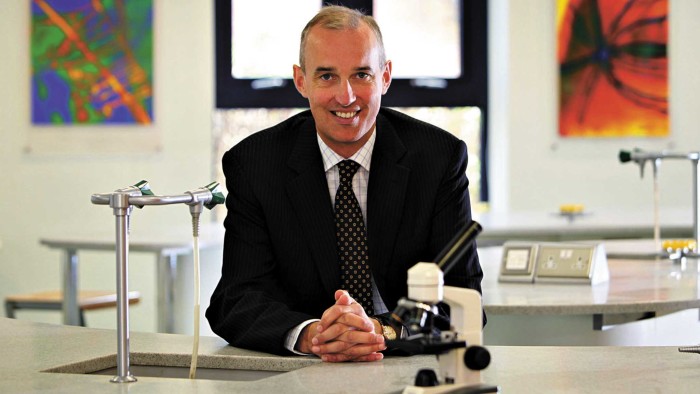Teachers get ahead of the class

Simply sign up to the Business education myFT Digest -- delivered directly to your inbox.
On Wednesday, the first day of a new academic year at Dr Challoner’s Grammar School, 1,300 boys will walk or drag their heels through its gates in Amersham, Buckinghamshire.
“Looking after 1,300 students is the easy part, as 99 per cent of the time they do what you want them to do,” says headteacher Mark Fenton.
“It’s managing 150 staff that’s the much bigger task. Where once headteachers managed only teachers, who were all on the same terms and conditions, now we’re responsible for a much more diverse workforce of support staff doing very different jobs.”
Dr Challoner’s is one of the highest-achieving schools in the UK. It is state-funded but last year opted to become an academy. By the end of these summer holidays, as many as half of England’s 3,261 secondary schools may have converted to self-governing academies, funded by central government but autonomous of local authority control.
The academy and “free school” initiatives are prominent coalition government policies, designed to grant schools greater freedom to innovate and drive up standards. But with freedom comes greater responsibility on a headteacher’s shoulders to manage resources effectively – as well as managing pupil behaviour and teacher performance.
It is therefore hardly surprising that business schools and universities are anticipating an increase in the number of headteachers enrolling on MBA and other management and leadership programmes.
Almost 60 per cent of current heads in state-funded schools hold the National Professional Qualification for Headship (NPQH). This course, which is free for state-school heads, became mandatory in 2009 for all first-time headteachers working in the state sector. But the coalition government has made the NPQH optional again. Education secretary Michael Gove has asked the National College, which runs the NPQH, to revise the course so that it could be “seen in the same light as an MBA”. A wider range of providers, including universities, will be able to run the NPQH, which will link more closely to masters and other postgraduate qualifications, allowing trainee heads to move on to a higher degree if they wish.
In the meantime, universities and business schools have an opportunity to meet growing demand.
Mark Pegg is a director of Ashridge Business School, responsible for custom executive education business where clients include the Bank of England and the City of London. But he is also a parent with children at Dr Challoner’s Grammar School and in his role as a deputy chair of governors spotted a need for developing emerging leaders within the school.
He rolled out the School Leadership Development Programme at Ashridge in 2009. The programme began with six teachers from Dr Challoner’s and its sister school for girls. Last year it enrolled 11 teachers from six schools in the locality. Half a dozen Ashridge faculty staff give their time for free.
“I saw similarities between what needed to happen in schools with the sort of things we develop for senior managers and leaders in larger companies and public sector organisations,” says Mr Pegg, who doesn’t rule out awarding the programme diploma or even degree status at some point.
A handful of specialist education MBAs already exist. Keele University offers a two-year part-time education MBA and Canterbury Christ Church University delivers a one-year full-time MBA in education leadership and management via a partnership between its business school and faculty of education. And the University of London-affiliated Institute of Education (IoE) offers a two-year part-time MBA in educational leadership. “Leadership is leadership and the same principles apply in industry as in education. But what differs is context,” says programme director Tracey Allen.
…
The MBA fee at IoE is £11,000 – a snip compared with the cost of a typical MBA. But headteachers should not rule out the value of a general MBA either, says Andrew Day, who is beginning his job as executive director of the Northumberland Church of England Academy. Mr Day started his career as a teacher, then took an MBA at Durham Business School and ran his own travel business for 10 years, before returning to teach in 2006.
“The financial training, quality assurance and HR modules of my MBA are what I’ve found to be most useful,” says Mr Day.
“Whether you go down a specialist or general MBA route doesn’t really matter. But people in education shouldn’t be blinkered. On my general MBA I was learning with and from people working at ICI, Nissan and the NHS, and we found a whole range of similarities.”
Comments